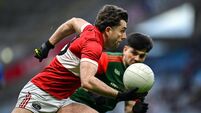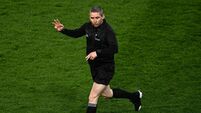Christy O'Connor: Clifford's mortal moments, Limerick scratch the itch

Galway’s Seán Kelly and David Clifford of Kerry. Picture: INPHO/James Crombie
In the 20th minute in Pearse Stadium Sunday, David Clifford received possession on the 13 metre line but he was immediately engaged by Seán Kelly and Seán Fitzgerald and forced to turned the ball over. Clifford had also turned over the ball with his previous possession. It was that type of day, where Clifford was never going – or wasn’t going to be allowed – to cut loose like he did against Galway last July.












